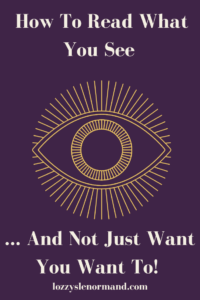 A notorious problem I notice for would-be Lenormand readers, is that when interpreting more than one card, some can have the tendency to interpret, not what is there in the cards, but what they WANT to see instead. This usually happens when they are reading for themselves, but can happen in answer to questions for others as well.
A notorious problem I notice for would-be Lenormand readers, is that when interpreting more than one card, some can have the tendency to interpret, not what is there in the cards, but what they WANT to see instead. This usually happens when they are reading for themselves, but can happen in answer to questions for others as well.
I know I feel that being intuitive is a big part of card-reading—but not so ‘intuitive’ that you just completely make up what the cards in front of you are saying!
Otherwise, there’s really no point in bothering to use them at all!
So Why Do We Sometimes NOT Read What We See?
The most common reasons tend to be as follows
- The cards don’t give us the answer we wanted—especially in a very personal situation (love readings are notorious for this)
- We are too emotionally involved or invested
- We are wedded to a particular answer and aren’t open to seeing anything else
- We are reading for someone else and are imposing our personal opinion onto them/the situation, not what the cards are telling us
- We are going BEYOND the meanings of the cards into a story of our own making!
- We’re worried that the cards are being a bit too ‘strong’ so decide to change them
- We are muddled about the meanings of certain cards, or don’t know how they work with others
An Example Of Not Reading What We See
Here’s the example I used in my post a while back about common accuracy mistakes.
“I asked the cards the question, “Is he my soulmate and will we be together for ever and ever?” I think these cards are saying YES, definitely, and we will get together soon!”
The cards in question?





So no, they are not saying that! The Ring suggests that he is married or otherwise committed, the Mountain shows a barrier or obstacle, the Anchor, that it’s lasting, and this represents a permanent barrier to anything happening between you.
Okay, So How Can We Make Sure We Are Reading What Is THERE And Not What We Want To See?
Here are my 7 Top Tips for doing so!
 Tip 1: NEVER read when you’re very emotionally invested in a particular answer
Tip 1: NEVER read when you’re very emotionally invested in a particular answer
This is tricky because it’s often the times when you’re most ‘desperate’ that you might decide to turn to fortune telling cards. As I say, this happens most often in love readings. As in the example above, though, that emotion is likely to skew your interpretations. I mean, sure, if it makes you feel better to hear what you want to, but it’s still not the answer the cards are giving you.
Tip 2: Slow down and take a step back!
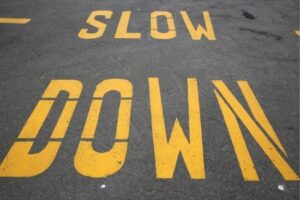 Emotional over-investment can also make you ‘rush’ over things that you might not want to see while clamouring to see what you do want to. So try to take an emotional step back, and don’t rush it. You might want to consider, before you read the cards, what answer you were hoping for, and what answers you would very much NOT like to see. Be honest with yourself about your motives and hopes for the reading. That way, you’re aware of any potential bias before you start and can come at it with a more objective mindset.
Emotional over-investment can also make you ‘rush’ over things that you might not want to see while clamouring to see what you do want to. So try to take an emotional step back, and don’t rush it. You might want to consider, before you read the cards, what answer you were hoping for, and what answers you would very much NOT like to see. Be honest with yourself about your motives and hopes for the reading. That way, you’re aware of any potential bias before you start and can come at it with a more objective mindset.
If you want to take a deeper look and think about WHY you want to ask the questions you do here, check out this post:
How To Get To The Root Of A Lenormand Reading
Tip 3: Make sure you read EVERY card and give EVERY card as much weight as other cards
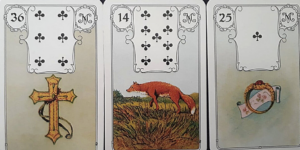 Another perennial problem, where people may leave out a particular card because it’s awkward, doesn’t seem to fit easily into the story they were telling, or just because they don’t want to see it.
Another perennial problem, where people may leave out a particular card because it’s awkward, doesn’t seem to fit easily into the story they were telling, or just because they don’t want to see it.
. Yes, the central card is often the core feature of the reading, but otherwise, the rest are ALL there for a reason and should be taken into account. Make yourself consider EACH of them one by one if you have to. Also remember that most cards in a reading can be both the topic and the influencer of a topic.
In the example here, we have the Cross, denoting a burden, guilt, responsibility or suffering, the Fox, denoting deceptions or someone untrustworthy, out for what they can get, and the Ring, denoting an agreement or commitment of some kind. ALL three elements are just as important as each other. So if our question and situation was, say, “What should I know about this potential love relationship?” how would you answer it?
Personally, I’d say that the love relationship these cards show brings the burden of deception in some way, or that there’s a deception involved that causes suffering or guilt, something that weighs on you (Cross-Fox). The Ring for agreements or commitments, meanwhile, influences both the Cross and the Fox. There’s some kind of ‘deal’ or commitment being made to both the obligations, with the Cross and Ring (so this suggests a relationship that’s going to come with strings, that obligates you in some way) and to the deception involved, with the Fox and the Ring; that whatever the deception is, it’s ‘agreed to’. The cards don’t specify, but in this context, this would strongly suggest an affair to me, perhaps an ‘arrangement’ that involves deceiving others and may bring burdens and responsibilities with it.
Tip 4: Always focus on the cards’ core essence meanings
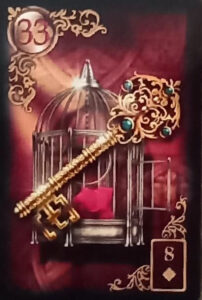 Obviously, it’s essential that you have a firm understanding of ALL the card meanings. Added to that, try to consider each of the cards in the context of the question you’re asking, as well as in relation to each other. I would avoid the very rigid, restrictive meanings of the traditional “an enormous fortune from marine enterprises” variety (too culturally and historically specific) and instead focus on the KEY ESSENCE MEANINGS of each of the cards. The cards DO all have very distinct essence meanings, though, so be careful to ensure you are not just trying to twist them to fit, but it usually helps to apply those underlying essence meanings to your questions rather than try to shoehorn overly rigid meanings into a scenario where they simply don’t fit.
Obviously, it’s essential that you have a firm understanding of ALL the card meanings. Added to that, try to consider each of the cards in the context of the question you’re asking, as well as in relation to each other. I would avoid the very rigid, restrictive meanings of the traditional “an enormous fortune from marine enterprises” variety (too culturally and historically specific) and instead focus on the KEY ESSENCE MEANINGS of each of the cards. The cards DO all have very distinct essence meanings, though, so be careful to ensure you are not just trying to twist them to fit, but it usually helps to apply those underlying essence meanings to your questions rather than try to shoehorn overly rigid meanings into a scenario where they simply don’t fit.
And if you want to learn the card meanings in depth, including regional and traditional/modern variations, and meanings in different contexts, my online Learn Lenormand Card meanings has that and more, and will give you a TON of practice!
Tip 5: Don’t ‘reinterpret’ some of the cards to mean what you want them to or what ‘sounds better’
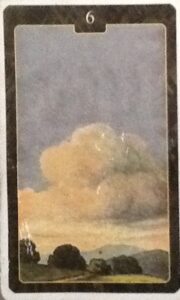 I’ve seen a few cases where people either don’t really understand the meanings of each of the card essences fully, or try to significantly change the meaning because they think ‘it sounds better’ or is ‘too harsh’ or simply isn’t what they want to hear. Yes, you may sometimes have to dial meanings up or down, depending on the circumstances of your question, but that doesn’t mean you can change them completely. The Coffin DOESN’T mean ‘transformations’ (unless it’s paired with the Storks): it means endings. The Ring means the commitment, not the romance side of love. The Scythe means ‘cuts’, separations and divisions, as well as pain, not arguments (although in practice arguments may be the cause); the Whip is the card that specifies arguments, and no, it doesn’t mean ‘multiples’ because there can be more than one meaning – that’s the Crossroads. See what I mean? The House on its own does not mean ‘relocation’, as the House itself is not the movement card; that’s the Ship.
I’ve seen a few cases where people either don’t really understand the meanings of each of the card essences fully, or try to significantly change the meaning because they think ‘it sounds better’ or is ‘too harsh’ or simply isn’t what they want to hear. Yes, you may sometimes have to dial meanings up or down, depending on the circumstances of your question, but that doesn’t mean you can change them completely. The Coffin DOESN’T mean ‘transformations’ (unless it’s paired with the Storks): it means endings. The Ring means the commitment, not the romance side of love. The Scythe means ‘cuts’, separations and divisions, as well as pain, not arguments (although in practice arguments may be the cause); the Whip is the card that specifies arguments, and no, it doesn’t mean ‘multiples’ because there can be more than one meaning – that’s the Crossroads. See what I mean? The House on its own does not mean ‘relocation’, as the House itself is not the movement card; that’s the Ship.
So do be careful, and make sure you familiarise yourself with those subtle differences:
What’s The Difference? Cards That Often Get Confused
Tip 6: DON’T add in specific meanings that aren’t there
The other issue is sometimes to try to add in additional meanings that simply aren’t appearing among the cards you’ve got; taking the reading much, much further than it is showing, and suggesting things that aren’t actually in the cards.
“How is this work event likely to go?”
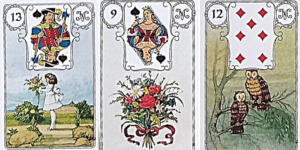
Child-Bouquet-Birds
“Oh my god, it’s going to be so brilliant, as a newbie you’ll meet and talk to loads of really nice and influential people and watch out because you might even find love and romance with a guy when you’re there!”
No!
Yes, there is talk (Birds), yes there is pleasantness or an offer (Bouquet), yes there is an indication of someone perhaps new and experienced or some kind of sense of openness (Child)
BUT there is no indication IN THESE CARDS of lots of people (Garden), even though there might be, and there is certainly no indication of romance anywhere here (Heart) or any specific person (Man)
A closer interpretation would be more likely to be:
“It should be very pleasant (Bouquet), with whoever you meet being kind and open, especially if you’re a newcomer (Child-Bouquet). Conversations should be polite and enjoyable and you may even find yourself with a spoken offer or just someone saying something really nice to you (Bouquet-Birds).”
This is a little different, though, from making an educated guess as I did above with the Cross-Ring-Fox as to what the story is suggesting in this context. But remember things like that are a ‘perhaps’: they’re just what the cards are suggesting to you, not ‘additional’ specific bits of information you’re adding in.
Tip 7: Force yourself to be systematic or step by step if you have to
Those of you who prefer a dreamy kind of vibe might find this difficult, but I find that letting my logic-brain kick in and making myself read the cards I see systematically FIRST really helps me get the distance I need. Only THEN do I let my creative/intuitive brain put it together into a story.
You have to literally follow the step by step instructions in any reading, being particularly careful to make sure you read ALL the cards. Make yourself do it. This is unlikely to work if you’re just doing it verbally, so yes, you will need to note it all down.
Sure, it doesn’t have a lot of mystique and it’s not something you’re going to be doing sitting in front of someone, but it’s often worth doing step by step. Check out the layout guides as to how you can approach it.
STILL STRUGGLING WITH INTERPRETING YOUR CARDS?
Get A Card Interpretation Reading From Me!
I offer several other reading types. Check out details below!
*Please note, you will need your own deck of Lenormand cards & to draw the cards yourself*
Grand Tableau Short Report $19.99
What do the cards want to tell you? This short report, based on the cards most immediately influencing the Querent ONLY, is the most akin to a traditional Lenormand reading. Usually blunt and to the point, it’s a popular general reading for those who are curious as to what the cards have to tell them: but is less suitable if you have specific questions. It is the cards which choose the topics, not the Querent!
Average report length: 5-7pp. Turnaround: 48 hours approx
Grand Tableau Key Areas Report $39.99
This is an expanded Grand Tableau report, based not only on the cards most immediately influencing the Querent, but also offering more exploration of client-specified areas of interest, and takes the ‘bigger picture’ story of the spread into account. That said, the cards will still only tell you what they want to tell you, and is unlikely to answer questions as directly or clearly as a smaller reading would. Key areas for focus might include Love or Career/Business Matters, Problems to Watch Out For, Areas of Success, for instance.
Average report length 10-12pp. Turnaround: 72 hours approx
Grand Tableau Full Report $84.99
This is an FULL and detailed Grand Tableau report, based not only on the cards most immediately influencing the Querent, but also offering explorations of ALL of the other cards in the reading, woven into a story directly relating to you. As such, there is a lot of detail, which can be overwhelming to the unitiated. Once again, as a general reading, my Full Grand Tableau is unlikely to answer questions as directly or clearly as a smaller reading would.
Average report length: 18-19pp. Turnaround: 8-10 days approx
NOT SURE WHICH SPREAD TO CHOOSE?
“I want to ask the cards a specific question on a life area eg love or work or about a person.”
Choose one of the short 5 card or 9 card reports.
5 card readings are more direct, 9 card readings more analytical and exploratory.
“I don’t have a specific question: I want a general reading, and to see what the cards have to tell me!
Choose a short Grand Tableau Report but be prepared for the cards to be quite blunt and to pick up whatever life areas they think you need to know about!
“I don’t have a specific question: I want a general reading, but also to see what the cards have to tell me about one or two specific life areas OR ask if a particular issue is showing up.”
Choose a Key Areas Grand Tableau Report for a more exploratory reading, and ask me to focus on particular areas and the overall picture as well as what’s appearing immediately around you, in the spread. Be aware the cards won’t necessarily be able to answer all questions directly or in the exact way you want; it will still depends on the story showing in the spread!
“I don’t have a specific question: I want a general reading, but on ALL possible life areas.”
Choose a FULL Grand Tableau Report for a detailed exploratory reading which looks at ALL 36 cards and strings them together in a storytelling way. Be aware there is a LOT of information in this reports, which some readers may find overwhelming.
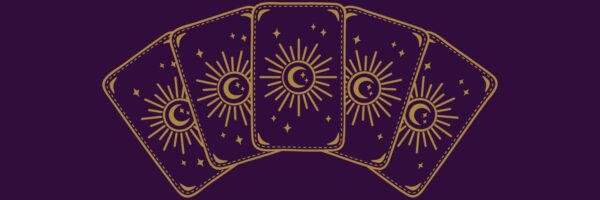
 Tip 1: NEVER read when you’re very emotionally invested in a particular answer
Tip 1: NEVER read when you’re very emotionally invested in a particular answer